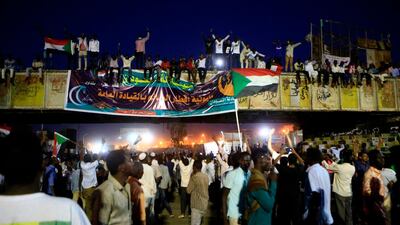Sudan's military rulers and the country's civilian protesters were expected to finalise the make-up of a new ruling body in a "short time," a senior general said on Monday, after talks faltered about whether the transitional council would have a civilian or military leader.
The two sides talked on Sunday about a sovereign council which would rule Sudan for a three-year transitional period after last month's removal of longtime autocrat Omar Al Bashir.
A military council that replaced him faced international pressure to install a civilian-led administration.
It is also the main demand of thousands of demonstrators who have spent weeks camped outside Sudan's army headquarters in the capital, Khartoum.
Hours of meetings which ran on into the early hours of Monday ended without agreement but the military council said talks would resume at 9pm in the presidential palace.
The military council's deputy chief, Gen Mohammed Hamdan Dagalo, said a deal was expected soon.
"We are going to reach a complete agreement between the council and the alliance in a short time," Gen Dagalo said at an iftar in Omdurman, Khartoum's twin city across the Nile.
One protest leader, who was at the talks, said the question of who would lead the transitional council had been a sticking point.
"The military council is still insisting that the president of the sovereign council should be from the military," said Satea Al Haj of the Alliance for Freedom and Change, which led the nationwide campaign against Mr Al Bashir. "They are justifying it by saying the country faces security threats."
The protest movement insists that civilians must command a majority on the council, a demand backed by major world powers, Mr Al Haj said.
"The international community and the African Union will not accept to deal with a military government," he said. "The people also want a civilian government."
Generals and protest leaders have already agreed on some key issues, including a three-year transition period and the creation of a 300-member parliament dominated by the protesters' representatives.
The new sovereign council is expected to form a transitional civilian government before elections after three years.
But observers say the body may turn out to be symbolic only, with real power resting in the office of the prime minister and the Cabinet.
An agreement on the new council's make-up was expected on Wednesday.
But the generals suspended negotiations for 72 hours, demanding that protesters remove roadblocks erected on several Khartoum avenues before any negotiations could proceed.
Demonstrators tore down the barricades but warned they would rebuild them unless the generals handed power over.
Abdelmoneim Seer vowed to continue protesting if the military stayed in power.
"If the military council does not meet all our demands at the next negotiation session, we will continue our sit-ins," Mr Seer said.
The generals have allowed protesters to continue with their sit-in at the army HQ.
Demonstrators began their sit-in against Mr Al Bashir on April 6, but refused to move after he was deposed by the military, pledging to stay until a civilian government was set up.
Protesters accuse the generals of clinging to power and ignoring their demands.
"A dirty political game is being played by the military council," said Mustafa Sadiq, who spent the night at the army complex.
The protesters' negotiators on Monday urged demonstrators to be patient.
"Victory is just a matter of patience and it is getting close," the Alliance for Freedom and Change said.
Protester Ahmed Nagdi said the Sudanese people had already waited "for decades".
"It is time to achieve our goals."

